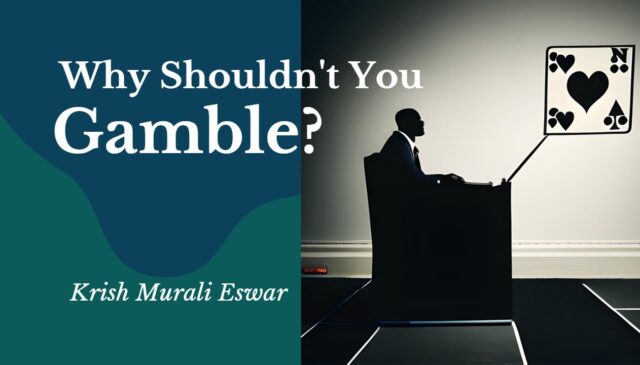
Gambling may seem harmless for some, but it can quickly become a harmful addiction. The thrill of the game and the prospect of winning big can be alluring, but the consequences of gambling can have dire impacts on one’s life. As a specialist in gambling addiction education, I am here to tell you why you shouldn’t gamble. Allow me to explain.
On the one hand, gambling promises excitement and entertainment. It offers an escape from everyday stressors and provides an opportunity to win money with little effort. However, this illusion is short-lived, as many individuals fall victim to its insidious grasp.
Gambling can lead to
- financial ruin,
- strained relationships,
- mental health issues and
- even criminal behavior.
The price is too high for something that initially seems so simple – which is why understanding the dangers associated with gambling is crucial for those seeking liberation from its grip.
The Addictive Nature Of Gambling
Gambling is a dangerous and addictive activity that can have serious negative consequences on your life.
It’s not just about losing money; it’s also about how gambling affects your brain chemistry and behavior.
When you gamble, your brain releases dopamine, a chemical that makes you feel good.

This rush of pleasure reinforces risky behavior, making it more likely that you will continue to gamble even when you know it’s not in your best interest.
Over time, this behavioral conditioning can lead to addiction, causing you to lose control over your impulse to gamble.
In addition, excessive gambling often leads to social isolation as people become consumed by their habits and withdraw from family and friends.
All these factors combine to make gambling an incredibly destructive force in people’s lives.
Financial Problems And Debt
Gambling can be an addictive behavior that can lead to severe financial problems and debt. There are also hidden costs associated with gambling that people often overlook.
Did you know the cost of problem gambling in India alone is around Rs.4,50,000 crores per year? This includes costs related to healthcare, criminal justice, and lost productivity.
Risky behavior like gambling puts individuals at significant risk of losing control over their finances and personal lives. When someone becomes addicted to gambling, they may lie to loved ones about their whereabouts or how much money they have spent on it.
This lack of control can quickly spiral out of hand and result in serious legal consequences, such as being arrested for fraud or embezzlement.
A person’s addiction could impact plans such as buying a house or starting a family due to poor credit scores or excessive debts.
Strained Relationships With Loved Ones
Gambling addiction can have profound effects on your loved ones. It’s common for individuals struggling with gambling to lie or hide their behaviors, leading to broken trust and damaged relationships. These lies often become a pattern of behavior that is difficult to break, leaving your loved ones feeling betrayed and hurt.
The emotional toll of gambling extends beyond just the individual struggling with addiction. Family conflicts arise as financial strain increases and priorities shift away from important relationships. Loss of intimacy becomes a reality as time and energy are channeled into gambling instead of meaningful connections. The loneliness and isolation felt by both the addict and their loved ones can be devastating.
If you struggle to walk away from gambling despite these consequences, consider seeking help before more damage is done. Losing trust hurts those closest to you. Damaged relationships leave lasting scars. Financial stress adds turmoil to daily life. Loneliness and isolation lead to depression.
It’s not too late to seek support and regain control over your life. By acknowledging the impact gambling has on yourself and others, you take an essential step toward healing. Remember that recovery takes time, but it’s worth investing in rebuilding relationships with those who matter most.
Mental Health Issues
It’s crucial to recognize that the negative consequences of gambling go far beyond just interpersonal conflicts.
Gambling addiction is often accompanied by
- isolation and depression,
- impulsivity and anxiety,
- substance abuse,
- self-esteem issues and
- feelings of worthlessness.
In some cases, severe mental health problems, such as suicidal thoughts and behaviors, may arise.

Isolation and depression are common side effects of gambling addiction because individuals who struggle with this disorder often become consumed by their habit. They may begin to avoid social situations or withdraw from activities they once enjoyed in favor of spending more time at casinos or online gambling sites.
Additionally, when financial difficulties caused by excessive gambling start to pile up, these individuals may feel ashamed or embarrassed about their situation and avoid seeking help from friends or family members. This only exacerbates their sense of loneliness and despair.
It’s important to understand that if you’re struggling with a gambling addiction, reaching out for support is a critical first step toward recovery.
Making An Informed Decision About Gambling
Gambling can be appealing for many reasons. It offers the thrill of potentially winning big and can serve as a temporary escape from reality. However, it is essential to weigh the risks before gambling thoroughly.
Understanding odds and probabilities is crucial in making an informed decision about whether or not to gamble. It is also essential to consider alternative activities that provide enjoyment without the potential harm of gambling addiction. Setting boundaries, such as limiting time spent on gambling and setting financial limits, can help prevent excessive spending and harmful behavior.
If you struggle with compulsive gambling, seeking help from a professional therapist or support group can provide resources for recovery and overcoming addiction. Remember, there are healthier ways to find excitement and fulfillment than risking your hard-earned money on games of chance.
Frequently Asked Questions
What Are Some Common Types Of Gambling?
Online gambling has become increasingly popular due to its convenience and accessibility.
Sports betting is another form of gambling many people partake in, often leading to dangerous risk-taking behavior.
Lottery tickets are also commonly purchased by those seeking a quick thrill or chance at monetary gain.
Slot machines can be found in casinos and other establishments, providing users an addictive experience through flashing lights and sounds.
Lastly, poker games continue attracting players who enjoy the strategic element.
While these forms of gambling may seem harmless, they can quickly spiral out of control for those prone to addiction.
Understanding the potential consequences before engaging in any gambling activity is crucial.
Are There Any Benefits To Gambling?
Gambling can be a tempting mistress, luring you in with the promise of riches and excitement. However, I must stress the importance of understanding the pros and cons before succumbing to its seductive pull.
The economic impact can devastate those who fall into its grasp, while the psychological effects may leave lasting scars. And let’s not forget about the addiction risks and social implications that come along with it.
While gambling may have some benefits, such as the rush of adrenaline or potential financial gain, these should never outweigh the potential harm that comes with this activity. As someone who has seen firsthand how destructive gambling can be, I urge you to think twice before taking that first bet.
Liberation from this temptation is possible, but only if we consciously avoid it.
Can Gambling Be A Hobby Or A Form Of Entertainment?
Many individuals perceive gambling as a hobby or form of entertainment, but it is important to acknowledge the risks involved.
Addiction potential and harmful consequences are prevalent in gambling activities that may lead to social implications and financial impact on one’s life.
As an addiction educator, I urge audiences to recognize the dangers associated with gambling and seek help if they struggle with this habit.
It is essential to understand that gambling should not be taken lightly, as it can harm one’s well-being.
Instead of turning towards gambling for leisure, consider alternative forms of entertainment that do not pose such high risks.
How Do Casinos And Other Gambling Establishments Make Money?
They rely heavily on the house edge, which is their mathematical advantage over players in every game.
Additionally, these establishments use psychological tricks to keep players engaged and spend more money than intended.
There’s also a high risk of addiction to gambling, as well as the potential for money laundering activities to take place within the industry.
Regulatory oversight helps prevent some of these issues. Still, ultimately it’s up to individuals to recognize the risks associated with gambling and make informed decisions about whether or not to partake in this entertainment.
True liberation comes from being aware of our choices and making conscious decisions that align with our values and goals.
What Are Some Alternatives To Gambling For Those Who Enjoy The Thrill Of Risk-Taking?
Did you know that only 10% of day traders make money consistently?
Instead of online trading, why not try extreme sports or adventure travel for an adrenaline rush?
Investing and entrepreneurship can also satisfy the desire to take risks while potentially yielding long-term rewards.
It’s essential to find healthy outlets for our need for excitement rather than relying on the instant gratification of gambling.
Remember, many ways exist to experience thrills without risking your financial stability and well-being.
Conclusion
I know firsthand the dangers and risks associated with this activity. While some may argue that there are benefits to gambling, such as the thrill of risk-taking or the potential for financial gain, these reasons pale in comparison to the negative consequences that can result.
One common objection is that gambling can be a hobby or entertainment. However, it’s essential to recognize that hobbies and entertainment should bring joy and fulfillment without causing harm or addiction.
Gambling can quickly become an unhealthy obsession, leading to financial ruin, relationship problems, and mental health issues like depression and anxiety. It’s simply not worth the risk.
Instead of turning to gambling for excitement, consider exploring other activities such as sports, art, or music. These pursuits offer similar opportunities for challenge and growth while providing positive outlets for stress relief and creativity.
Remember: when it comes to gambling, the odds are never in your favor. Don’t let temporary pleasure lead to long-term pain – choose healthier alternatives that will enrich your life instead of draining it away.
Let me know how I can help you.
Be Blessed by the Divine!
Krish Murali Eswar.
Leave a Reply